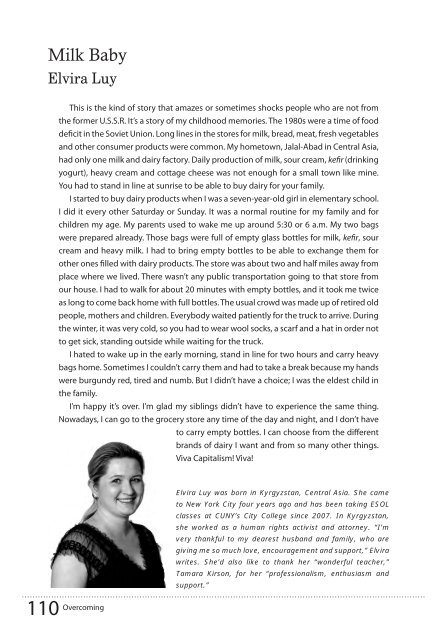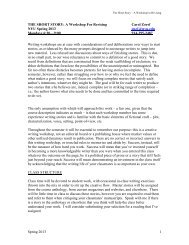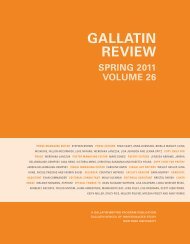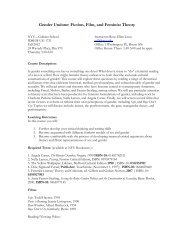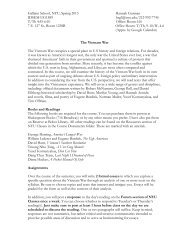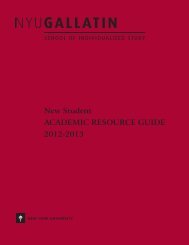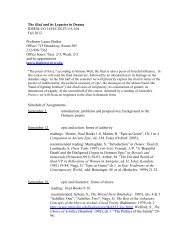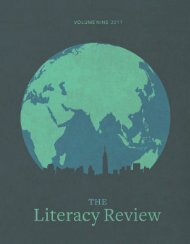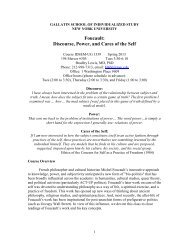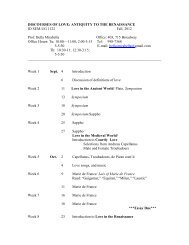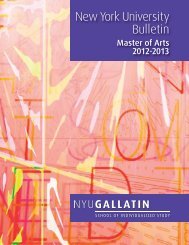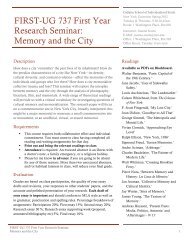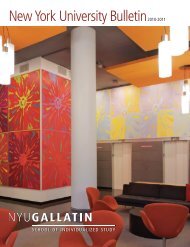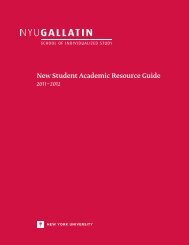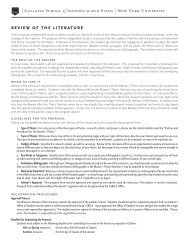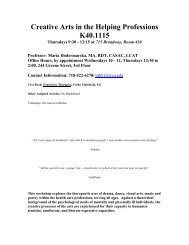The Literacy Review - Gallatin School of Individualized Study - New ...
The Literacy Review - Gallatin School of Individualized Study - New ...
The Literacy Review - Gallatin School of Individualized Study - New ...
Create successful ePaper yourself
Turn your PDF publications into a flip-book with our unique Google optimized e-Paper software.
Milk Baby<br />
Elvira Luy<br />
110 Overcoming<br />
This is the kind <strong>of</strong> story that amazes or sometimes shocks people who are not from<br />
the former U.S.S.R. It’s a story <strong>of</strong> my childhood memories. <strong>The</strong> 1980s were a time <strong>of</strong> food<br />
deficit in the Soviet Union. Long lines in the stores for milk, bread, meat, fresh vegetables<br />
and other consumer products were common. My hometown, Jalal-Abad in Central Asia,<br />
had only one milk and dairy factory. Daily production <strong>of</strong> milk, sour cream, kefir (drinking<br />
yogurt), heavy cream and cottage cheese was not enough for a small town like mine.<br />
You had to stand in line at sunrise to be able to buy dairy for your family.<br />
I started to buy dairy products when I was a seven-year-old girl in elementary school.<br />
I did it every other Saturday or Sunday. It was a normal routine for my family and for<br />
children my age. My parents used to wake me up around 5:30 or 6 a.m. My two bags<br />
were prepared already. Those bags were full <strong>of</strong> empty glass bottles for milk, kefir, sour<br />
cream and heavy milk. I had to bring empty bottles to be able to exchange them for<br />
other ones filled with dairy products. <strong>The</strong> store was about two and half miles away from<br />
place where we lived. <strong>The</strong>re wasn’t any public transportation going to that store from<br />
our house. I had to walk for about 20 minutes with empty bottles, and it took me twice<br />
as long to come back home with full bottles. <strong>The</strong> usual crowd was made up <strong>of</strong> retired old<br />
people, mothers and children. Everybody waited patiently for the truck to arrive. During<br />
the winter, it was very cold, so you had to wear wool socks, a scarf and a hat in order not<br />
to get sick, standing outside while waiting for the truck.<br />
I hated to wake up in the early morning, stand in line for two hours and carry heavy<br />
bags home. Sometimes I couldn’t carry them and had to take a break because my hands<br />
were burgundy red, tired and numb. But I didn’t have a choice; I was the eldest child in<br />
the family.<br />
I’m happy it’s over. I’m glad my siblings didn’t have to experience the same thing.<br />
Nowadays, I can go to the grocery store any time <strong>of</strong> the day and night, and I don’t have<br />
to carry empty bottles. I can choose from the different<br />
brands <strong>of</strong> dairy I want and from so many other things.<br />
Viva Capitalism! Viva!<br />
Elvira Luy was born in Kyrgyzstan, Central Asia. She came<br />
to <strong>New</strong> York City four years ago and has been taking ESOL<br />
classes at CUNY’s City College since 2007. In Kyrgyzstan,<br />
she worked as a human rights activist and attorney. “I’m<br />
very thankful to my dearest husband and family, who are<br />
giving me so much love, encouragement and support,” Elvira<br />
writes. She’d also like to thank her “wonderful teacher,”<br />
Tamara Kirson, for her “pr<strong>of</strong>essionalism, enthusiasm and<br />
support.”


